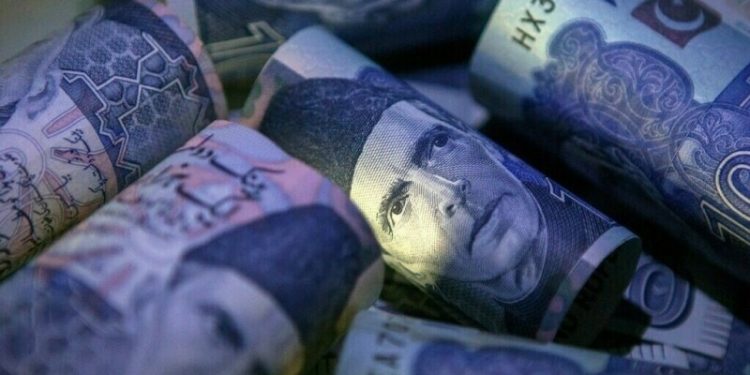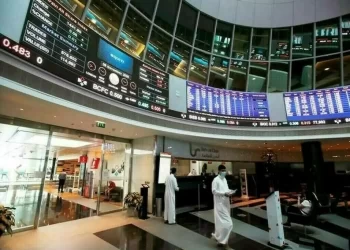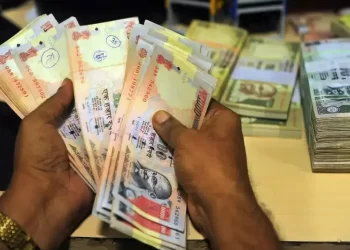The Pakistani rupee remained largely stable against the US dollar during the opening hours of trading in the inter-bank market on Monday.
At 10:10am, the currency was hovering at 277.53, a loss of Re0.01 against the US dollar.
During the previous week, the rupee made further improvement as it gained Re0.12 or 0.04% against the US dollar.
The local unit closed at 277.52, against 277.64 it had closed the week earlier against the greenback, according to the State Bank of Pakistan (SBP).
The currency market is now seen as being stable after the Executive Board approved the fresh bailout programme with the International Monetary Fund (IMF), and the subsequent receipt of the first tranche.
Internationally, the US dollar extended a rally sparked by Friday’s strong U.S. jobs data and an escalation in the Middle East conflict.
The US dollar’s gains followed a US jobs report that showed the biggest jump in jobs in six months in September, a drop in the unemployment rate and solid wage rises, all pointing to a resilient economy and forcing markets to reduce pricing for Federal Reserve rate cuts.
Market expectations have swung to the extreme for the Federal Reserve to do just a 25 bps cut in November, rather than 50 bps, following the jobs data. They now price in a 98% chance of a quarter-point cut, up from 47% a week ago, and a 2% chance of no cut at all, according to CME’s FedWatch tool.
The dollar index measure against major peers was flat. It rose 0.5% on Friday to a seven-week high, logging more than 2% gains for the week, its biggest in two years.
Oil prices, a key indicator of currency parity, fell on Monday after posting their steepest weekly rise in over a year last week as oversupply concerns amid softer demand countered the worries of a wider Middle East war disrupting exports in the key producing region.
Brent crude futures fell 31 cents, or 0.4%, to $77.74 per barrel by 0435 GMT. U.S. West Texas Intermediate crude futures slipped 20 cents, or 0.27%, to $74.18 per barrel.
Brent rose by over 8% last week, the biggest weekly gain since January 2023, while the WTI contract gained 9.1% week-on-week, the most since March 2023, on expectations that Israel could strike Iranian oil infrastructure in response to an Iranian missile attack on Israel on Oct. 1.
This is an intra-day update
The Pakistani rupee remained largely stable against the US dollar during the opening hours of trading in the inter-bank market on Monday.
At 10:10am, the currency was hovering at 277.53, a loss of Re0.01 against the US dollar.
During the previous week, the rupee made further improvement as it gained Re0.12 or 0.04% against the US dollar.
The local unit closed at 277.52, against 277.64 it had closed the week earlier against the greenback, according to the State Bank of Pakistan (SBP).
The currency market is now seen as being stable after the Executive Board approved the fresh bailout programme with the International Monetary Fund (IMF), and the subsequent receipt of the first tranche.
Internationally, the US dollar extended a rally sparked by Friday’s strong U.S. jobs data and an escalation in the Middle East conflict.
The US dollar’s gains followed a US jobs report that showed the biggest jump in jobs in six months in September, a drop in the unemployment rate and solid wage rises, all pointing to a resilient economy and forcing markets to reduce pricing for Federal Reserve rate cuts.
Market expectations have swung to the extreme for the Federal Reserve to do just a 25 bps cut in November, rather than 50 bps, following the jobs data. They now price in a 98% chance of a quarter-point cut, up from 47% a week ago, and a 2% chance of no cut at all, according to CME’s FedWatch tool.
The dollar index measure against major peers was flat. It rose 0.5% on Friday to a seven-week high, logging more than 2% gains for the week, its biggest in two years.
Oil prices, a key indicator of currency parity, fell on Monday after posting their steepest weekly rise in over a year last week as oversupply concerns amid softer demand countered the worries of a wider Middle East war disrupting exports in the key producing region.
Brent crude futures fell 31 cents, or 0.4%, to $77.74 per barrel by 0435 GMT. U.S. West Texas Intermediate crude futures slipped 20 cents, or 0.27%, to $74.18 per barrel.
Brent rose by over 8% last week, the biggest weekly gain since January 2023, while the WTI contract gained 9.1% week-on-week, the most since March 2023, on expectations that Israel could strike Iranian oil infrastructure in response to an Iranian missile attack on Israel on Oct. 1.
This is an intra-day update









